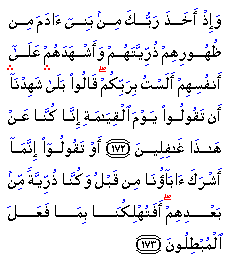Al-Araf (The
Heights)
Chapter 7: Verse 172-173
 The
Covenant Made During Pre-Creation The
Covenant Made During Pre-Creation
“When your Lord drew forth
from the loins of the children of Adam their descendants and made them
testify concerning themselves. (Saying): 'Am I not your Lord?' They said,
'Yes, we testify to it.' (This) in case you say on the Day of Judgement,
'We were unaware of this'. Or in case you say, 'It was our ancestors who
made partners (with Allah) and we are only their descendants. Will you
then destroy us for what those liars did?'”
These verses confirm the fact that everyone
is responsible for belief in God and on the Day of Judgement
excuses will not be accepted.
Since Allah made all human beings swear to His Godhood when He created
Adam, this oath is printed on the human
soul even before it enters the fetus in the fifth month
of pregnancy. So when a child is born, it has with it a natural belief
in Allah. This natural belief is called in Arabic the 'Fitrah'. If the
child were left alone, it would grow up aware of Allah in His unity, but
all children are affected by the pressures of their environment whether
directly or indirectly. So, just as the child's body submits to the physical
laws which Allah has put in nature, its soul also submits naturally to
the fact that Allah is its Lord and Creator. But its parents try to make
it follow their own way and the child is not strong enough in the early
stages of its life to resist or oppose its parents. The religion which
the child follows at this stage is one of custom and upbringing and Allah
does not hold it to account or punish it for this religion. When the child
matures in youth and clear proofs of the falsehood of its religion are
brought to it, the adult must now follow the religion of knowledge and
reason.
The covenant which every man made to Allah during pre-creation was that
he would recognize Allah as his Lord and not direct any form of worship
to others besides Him. This covenant is fulfilled by sincerely believing
in Tawheed (Allah's Unity) and putting that belief into practice in daily
life. Tawheed is put into practice by avoiding all the acts of Shirk (setting
up partners with Allah) and by closely following the last messenger whom
Allah sent as a practical and living example of life based on the principle
of Tawheed. Because man has declared that
Allah is his Lord, he must then consider righteous deeds to be only those
defined by Allah and His prophet (SA) as being righteous, and evil deeds
likewise.
Source:
"The Fundamentals of Tawheed" - Abu Ameenah Bilal Philips, pp
45-53
[Submitted by Zeeshan Mahmood, Mississauga, Canada] |